Evgenia, entrepreneur, sniper: “It's hard to shoot at a person the first time. But it passes"
Before the full-scale invasion of Ukraine, I led a normal life – I was a happy mother, daughter, friend and entrepreneur. I was in business for about 12 years and very successfully, but the war changed everything.
Going to serve was not an emotional decision for me, I had been preparing for this for a long time. Ten years ago, I graduated from the military department, where I received the officer rank of junior lieutenant, which allowed me to take part in the war. In 2014, they did not take me, because I had a child under three years old – I could not leave him by law, and now my daughter has grown up, and nothing could stop me.
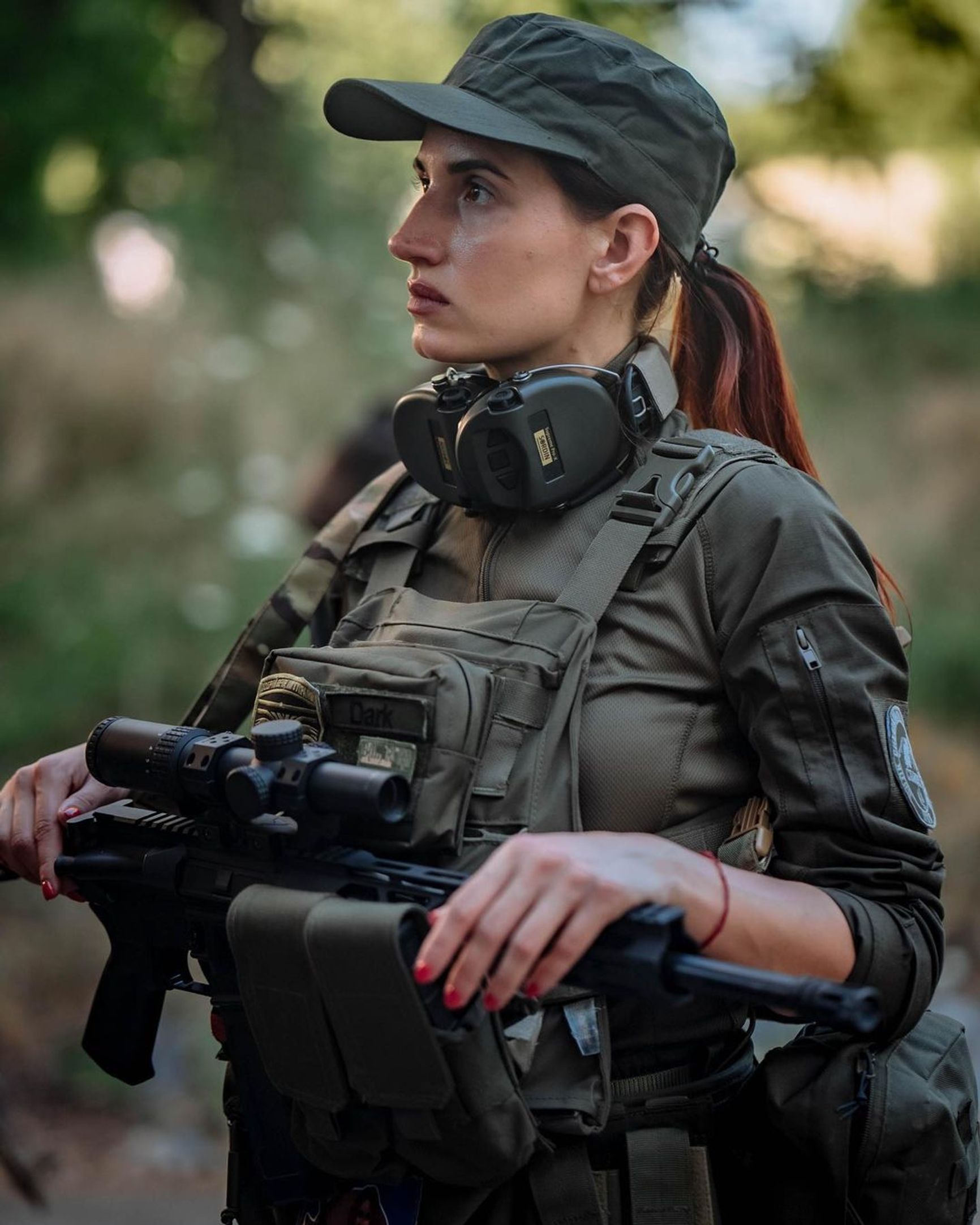
I serve in the Safari Special Forces Regiment, that is, in the special forces. We have well-trained people and a fairly powerful unit that works mobile. It was created at the very beginning of the war and sharpened for specific tasks. We work exclusively in hot spots, and during these six months I have traveled half of Ukraine. Was in the Kyiv region, in Irpen, in the Zhytomyr region, Makarovsky district, Sumy, Kharkov, Akhtyrka.
In our special forces, everyone has their own position. I hold the position of a sniper, I am also considered a shooter – the shooters are all here by default. Accordingly, I have two weapons – a 38-caliber sniper rifle and an American R15 assault rifle, which was donated by volunteers, because the Kalash is too heavy for me. More modern weapons are much lighter and easier for a girl.
We do different types of missions, but I can't go into details, I can only say that the sniper's job is to observe and give coordinates. The belief that a sniper must shoot is absolutely wrong, sometimes you can give away your positions by this.
I am the only woman in the regiment, and at first, of course, there were misunderstandings about this, everyone thought why I was here – after all, a woman’s place is in the kitchen, but now they say: “Zhenya, what would we do without you? We would be bored." Everyone here calls me the Ukrainian Joan of Arc.
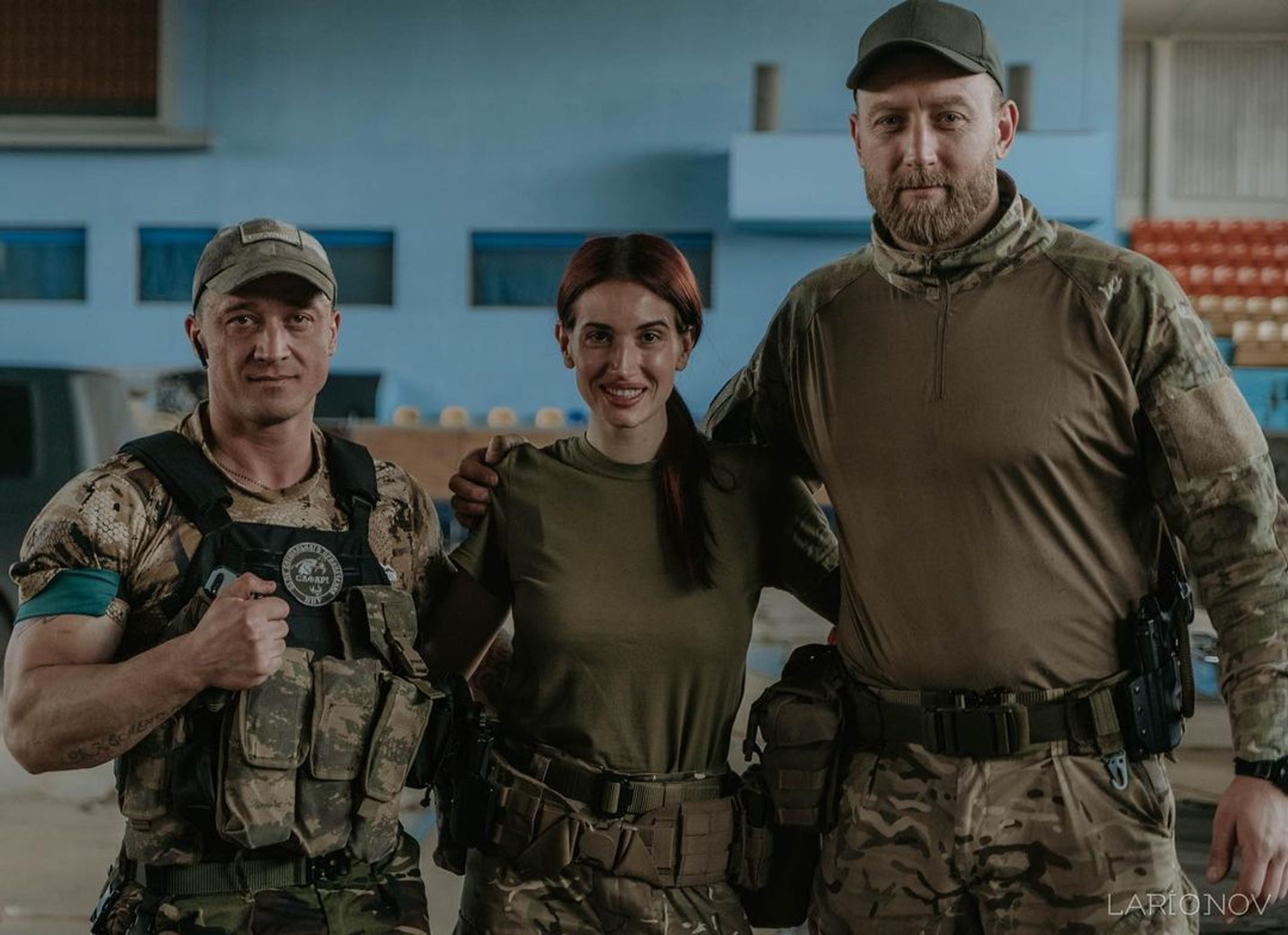
I don't like to generalize, I like to break patterns. With my work and perseverance, I proved that women are no different from men, and we are not competitors to them. I came not to compete, but to be equal. When we moved to the barracks, the commander immediately told me: “Zhen, we can provide you with separate housing, since you are a girl.” To which I replied that I would live with the boys. How will they treat me if I have better conditions? In every city we visited, I lived exclusively with men and slept with each of them in turn. It was difficult – they already perceived a smile and a good morning wish as flirting. Then I realized that I need to be stricter so that this is not regarded incorrectly, because I have exclusively business relations with the guys, they are like brothers to me.
But once an article was published about me in the press, which the Ukrainians took very positively, they began to repost on Instagram. My future fiancé saw this article, wrote to me, and we started talking. I was in a war zone, and so was he. After a while, he came to Kyiv for a rotation, the command let me go, and we finally met live. Then we spent three days together and realized that we were absolutely perfect for each other.
Three months later, he came to the regiment to the commanders and asked for my hand, as it should be according to military laws, after which he went down to my basement and made an offer, although for me it was an absolute shock – it was hard to believe that in such conditions I had family will be born. But war is not only about death, but also about life.
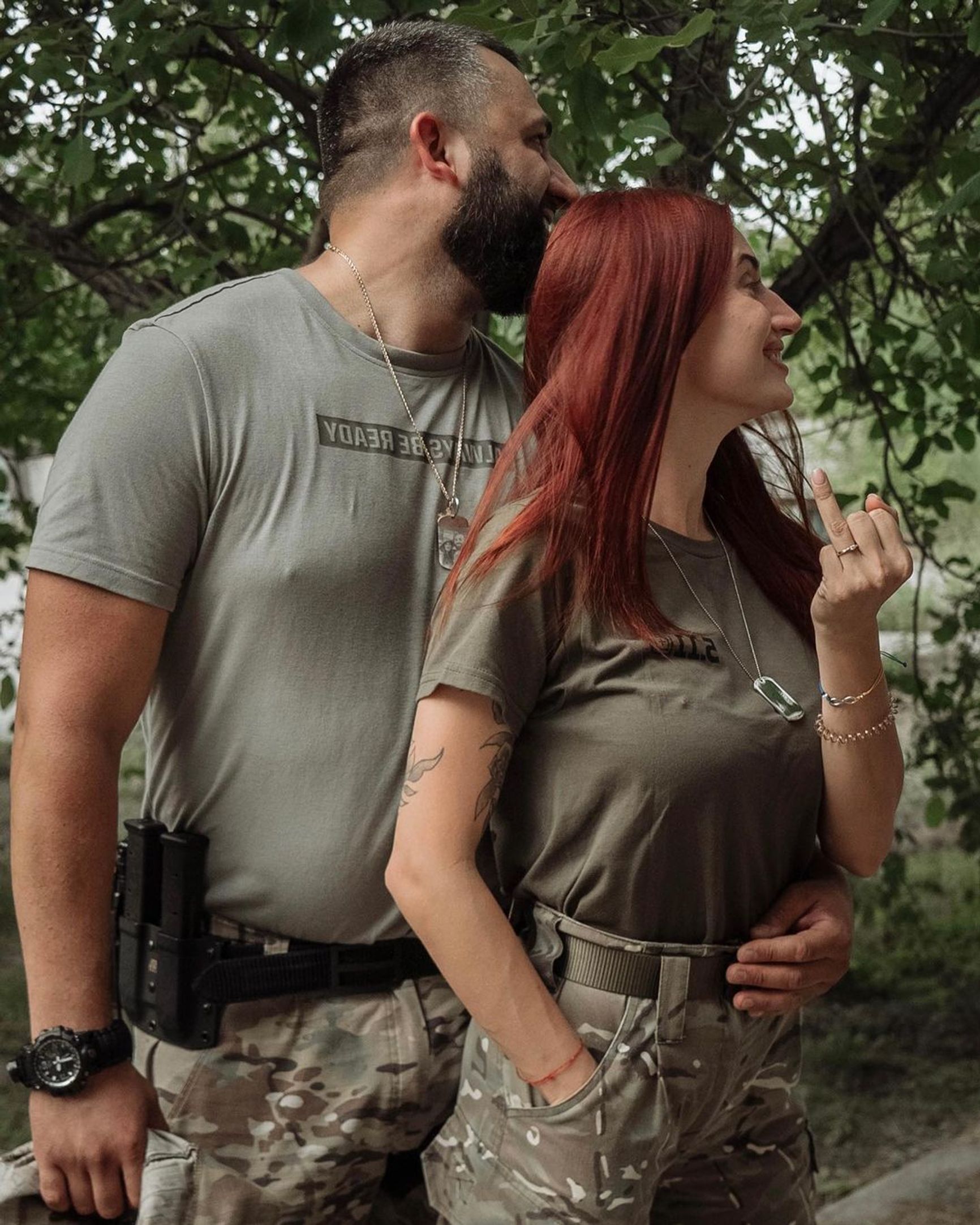
All of us get scared, and I had moments when I thought I would not survive. The last time such thoughts arose a couple of weeks ago on a military outing. I was there for five days, our position began to be attacked and beaten with "GRADs". The guys and I went down to the cellar in the local village, the cellar was shaking, there were parishes. The main thing is not to panic. If you succumb to panic, fall into sadness, lose your calmness, but you won’t change anything, death always walks nearby, and I often felt it.
I felt it in those moments when I saw the guys with whom I served in the regiment die. Four months ago, there were first losses in Kharkov, and three months ago, four rockets from the invaders hit our base. There were a lot of casualties and wounded, and among them was my sniper mentor, who taught me military sniping. For me it was a strong loss, I moved away from it for a month and a half. She didn't break me, but I thought it would break me. Even now, it's hard to remember. It seems to me that I cried so many tears that the Dnieper is not enough. I wasn't ready for this.
When my sniper mentor was killed, I cried so many tears that the Dnieper was not enough
Our days are completely different. If there are no military trips, then there are duties and outfits, and if there are no outfits, then there are trainings and training grounds. Sometimes there is a day off when you can do your own business, watch a movie or read. I try to get up early, but in this basement there is no understanding of time and I constantly want to sleep. But there is no time to sleep, we are obliged to keep ourselves in shape – this is regular sports, shooting, advanced training and, when possible, mandatory rest, because sleep energizes, heals and restores.
I am trying to live a normal life too – I continued to learn English, read the literature that I loved to read before the war, and actively social networks when I have time for it. I am a happy woman, I do what I love, I have built a family and I live the way I would like it to be. I even started to eat well – they gave me a slow cooker, a mini-fridge, I cook breakfast. A person, if desired, can create any conditions for himself – even in an abandoned basement.
I don't want to say straight out how often I killed. I'll tell you this – I had to work, and more than once. What do you feel about it? I don't know if everyone felt the same way, but many people I talked to said about the same thing. For the first time, it’s trembling all over your body, you realize that you will shoot at a person, you are afraid. This state lasts for about thirty seconds, you do not understand what is happening, and then you get ready, and it passes. A person gets used to everything – to eliminate targets, to watch explosions, to hear sirens, "GRADs". It was exactly the same when I felt death very close – also an interesting emotion, because at that moment you don’t think about your mother or child, you only think about how you will survive. The instinct of self-preservation is activated – you understand how much you want to live. I remember this feeling for a long time.
When you kill for the first time, you shudder, you get scared, but then it goes away
After this, of course, sometimes there were thoughts of leaving. I thought that I could no longer, but then I wondered – what will I do there, in civilian life? I have already given my word to the Ukrainian people that I will defend them to the end. If I chose this path, then it is up to me. There were doubts, and there were swings. In the third month of the war, a stage of awareness came, adrenaline passed, and many began to feel depressed, both among the military and civilians. To doubt and be afraid is the norm, thoughts of leaving will always arise in the head.
My family members are worried, of course. When I told them about the service, they were shocked. I still remember my mother's gaze into the void – she just sat and stared into nothing. When we talked later, they admitted that they decided that I would “play around” for a week, could not stand the conditions and return home, but when a month passed, they realized that they would only wait for me with a victory. I am very grateful for this support. But contemplating what life will be like when all this is over is difficult. A month ago, I said that the first thing I would do after the war was quit smoking and get married, but it turned out that I quit smoking last week, and they also already proposed to me.
Yarina, translator, paramedic: “You have to prove to men that you are strong enough and motivated”
I studied at the Kiev-Mohyla Academy at the Department of Literary Studies, was engaged in literary translation, as well as various civil projects. I went to serve because I wanted to join the struggle of my people for their native land. I joined the military back in 2019 as a paramedic in a volunteer battalion, and then I decided to sign a contract with the marines.
I stay in the war zone from time to time. Our rotation began in August 2021. On February 24, 2022, we were in positions near Severodonetsk. And then we were moved to Mariupol to hold back the advance of Russian troops. Then they returned to the Donbass in the Bakhmut area again. At the end of February, they were again transferred to the Mariupol direction, to the village of Zachatovka. It was my company that had rather heavy battles with the prevailing enemy forces. We held back a huge column of Russian tanks for a week in this village.
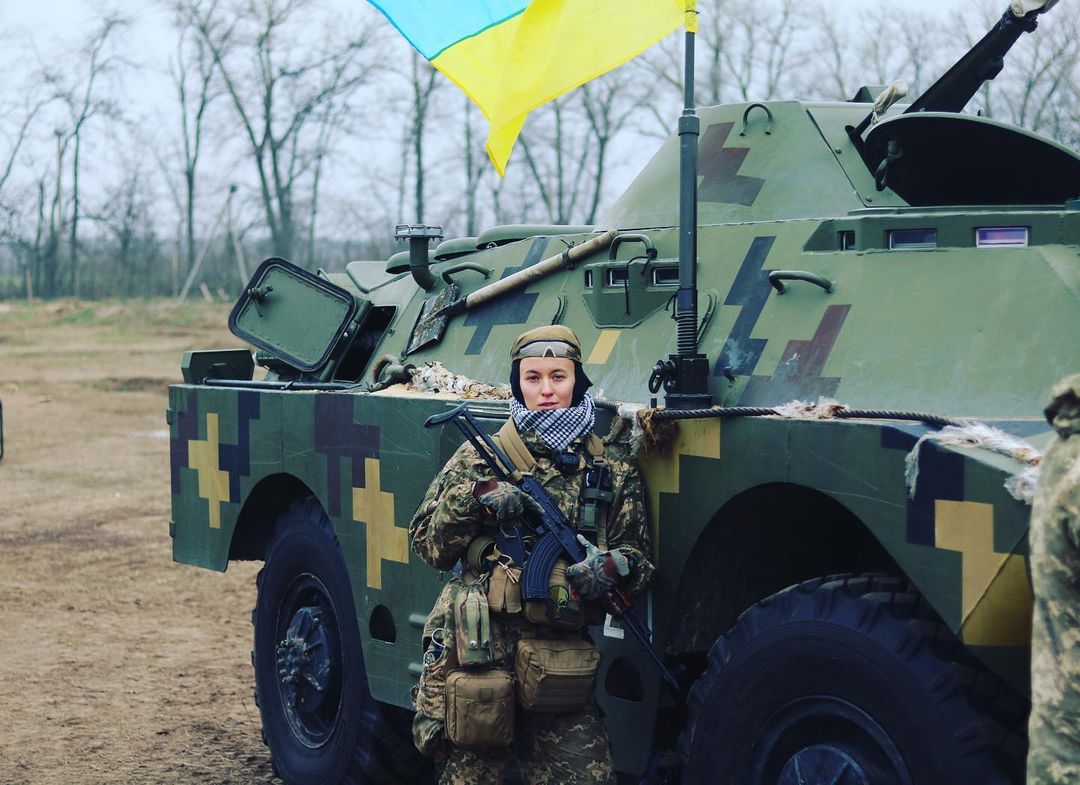
On March 3, five of my colleagues and I stood on a field road, where we were expected to leave the encirclement. And suddenly a huge column of Russian military men appeared – our car was burned, and we ourselves, shooting back, miraculously managed to retreat to our own. I often remember this moment when I lift a quadcopter into the sky, as I see now: literally 300 meters from us, a large convoy with Russian military is moving, and the first tank is rushing. Our people report, and as soon as I raise my hand to catch the quadcopter, as near me – literally five meters away, the car from which we moved away explodes.
I was lucky that it was not a thermobaric projectile, but some kind of cumulative one, which simply pierced it, and therefore the explosion was not very strong – only a hum in my ears. Then the shooting started, we started to shoot back, retreat, one of ours was wounded in the leg, but it didn’t strike much. And we were able to return to unite with the rest. Then we managed to repulse the attack, because the artillery was connected. But five days later, the same column left from the other side to the same place, but along a different road – again to the same cube where our position was. There were already many wounded in this clash, I remember how I had to run from one to another and bandage them.
There were many wounded – I had to run from one to another and bandage
One of the soldiers was wounded in the head, but, unfortunately, they could not be taken away. It still hurts a lot because of it. But the rest managed to escape and take more advantageous positions, where it was no longer difficult to restrain the Russians.
I was in almost all cities: Mariupol, Bakhmut, Konstantinovka, Turets, Severodonetsk, Happiness, Lisichansk, in the villages near Volnovakha. I managed to see almost the entire front line during the years of service, while I was in a volunteer battalion and in contact with the Armed Forces of Ukraine, from Lugansk to Donetsk. But in the directions of Nikolaev, Kherson and Kiev, where there were also battles, I was not there yet.
For any woman, serving is a difficult choice. If you want to be in a combat unit, you will have to go through the path of initiation, on which you must prove to the male team that you are strong enough, motivated, that you want and can do all the hard soldier work that men do. If you succeed, and you do everything on an equal footing with the rest – both at the base, and at the training ground, and in the combat zone, as a rule, you receive respect and serve on an equal basis with others.
I have no illusions that this war will end quickly, I know that as long as Putin is alive, and 95% of the Russian population is zombified by the propaganda of Kiselev and Skabeeva, we will not be able to live in peace. I rather tend to believe that we will have to fight for our state until the end of our lives.
Anastasia, psychotherapist: “I saw how dogs in Bucha smashed the limbs of bodies”
I am a practicing psychotherapist, a year and a half ago I received accreditation with the right to teach the Gestalt therapy method to others – in other words, to grow future specialists in this field. There were many plans, but the war changed everything.
On February 24, I woke up because my 13-year-old daughter came into the room and said that the war had begun. I didn’t understand anything, I decided that she had a dream, and then I saw the news myself in the Telegram channels. I called my ex-husband and said that I needed to take the child to the territory of Western Ukraine, while I myself remained in Kyiv.
Initially, I did not plan to serve in the Armed Forces of Ukraine. I was in a relationship with a man who had elderly parents, and we decided that he would go to serve, and I would go with him to look after them – as a military wife. But we started with volunteer activities – we were engaged in the delivery of humanitarian aid, delivered to the units everything that we were asked for, while not leaving the thought that we needed to mobilize.
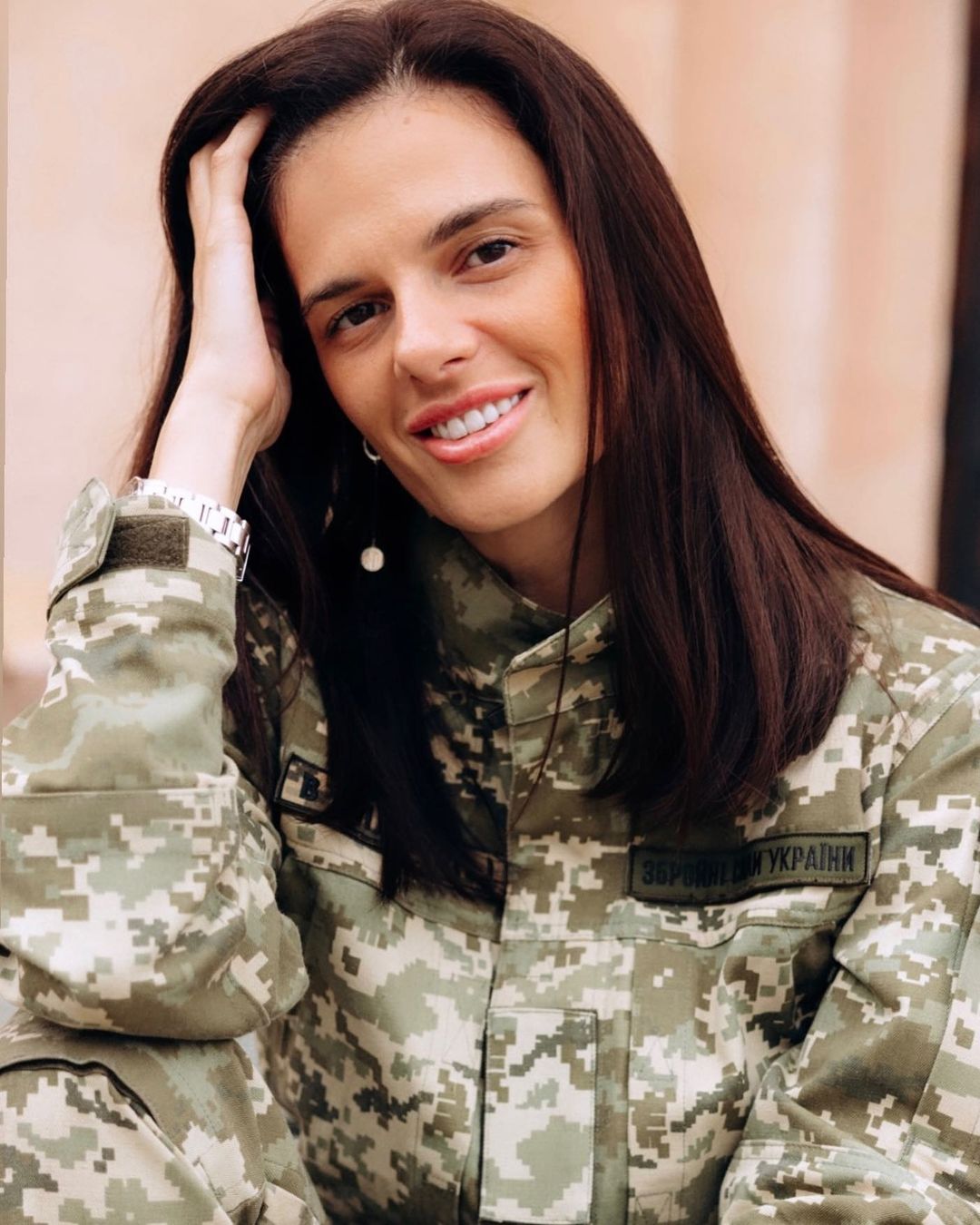
On my birthday, we were at the morning shopping, and, driving up to one of the military units, we came under fire. I was in the passenger seat, my young man was outside, talking on the phone – we were waiting for a signal to be given to us so that we could enter the territory of the military unit and bring food. And at that time the shelling began, I saw the eyes of one of those who took out weapons. I remember that look and the gun pointing at the car. I could not believe then that a person like me could just shoot without thinking about the life of another. I heard how the car was fired upon, how the windows were shattered from bullets, but I just sat in my tracks and looked at this man. I didn’t even have time to get scared and think about the fact that any bullet will now hit the forehead and I won’t be. The first thing I did was to cover myself with my hands, it seemed to me that if I closed it, it would not hurt me.
When it was all over, the Armed Forces of Ukraine took us to the unit, brought us to the elder, and my young man said that he wanted to mobilize. Within a few hours we were mobilized, I also agreed. Thus began our service.
March was especially dangerous. We were on the second corridor. When the fighting took place in Irpen and Bucha, it was 10-12 km from us, we got the cream of the crop – Retroville, the bombing of Antonov, constant skirmishes. This is scary. I am not a warrior, I do not live in war, and I really miss the peaceful life.
On the second day after the cleansing of the Armed Forces of Ukraine and the withdrawal of the Russian military, I was in Bucha and Irpin. I saw everything with my own eyes, talked with people who survived.
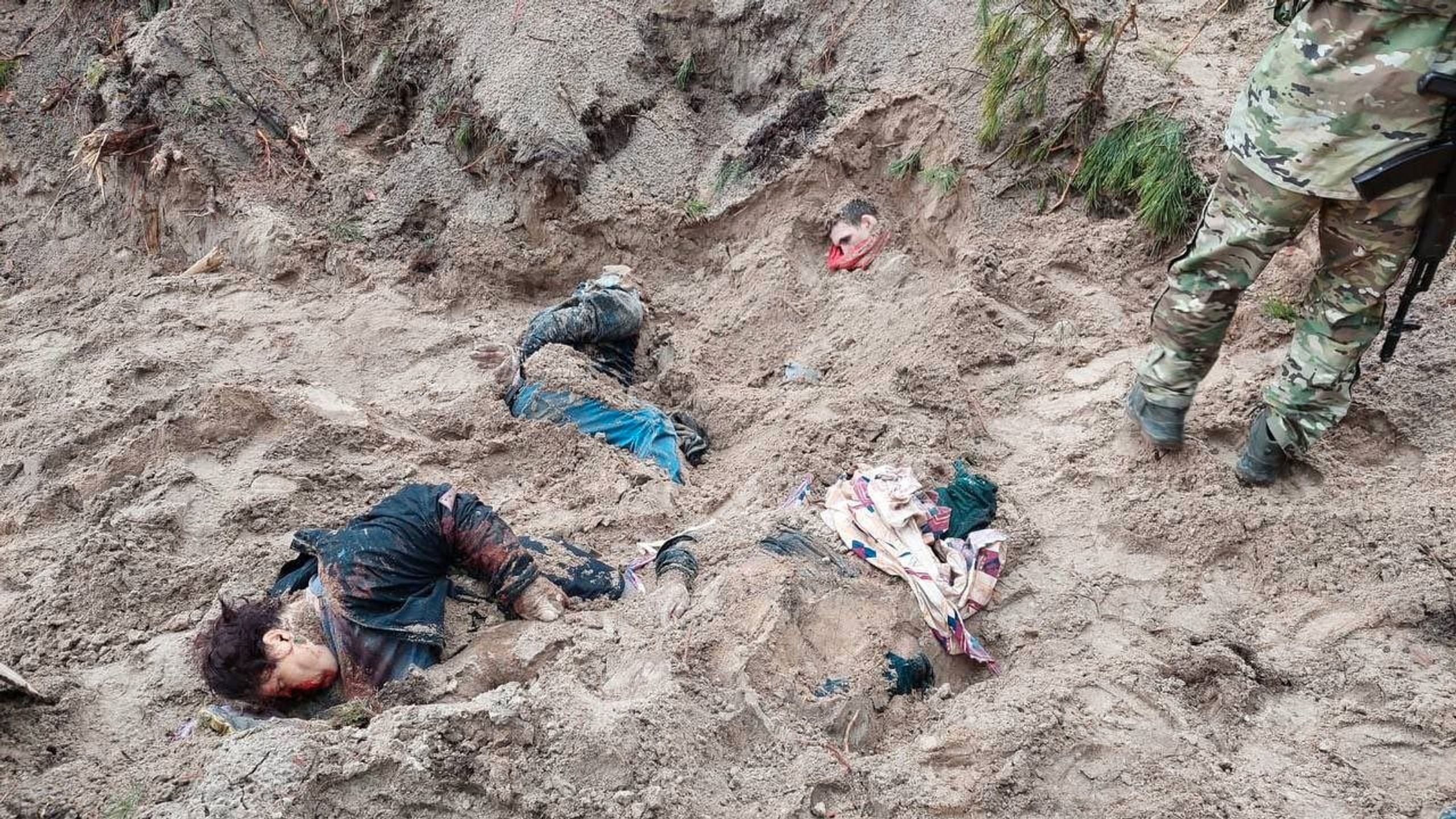
We saw how dogs carried the limbs of bodies that had not yet been buried, heard how people wept. We saw these large plots of land with ditches, where the killed civilians and soldiers were dumped into one heap, because there were an incredible number of them, and there were not enough cars to take out each one separately.
Dogs smashed the limbs of the bodies, people were dumped in the ditches
We were in the houses where the invaders lived and saw what they were doing there. I don't know how you can behave like this even when you're on foreign territory. You have occupied this house, it is already conditionally yours, you can be more careful in it – here is shit, here is toilet paper with shit, here is a mattress, here food is scattered, there are clothes lying around. My boys from the Armed Forces of Ukraine are even trying to maintain order in the trenches, but here at home, where you spend a lot of time. As far as I know, officers lived there. If they behave like this, then what are their soldiers doing? In one of the houses, which was filthy and filthy to the brim, a mirror said: "Thank you for your hospitality, sorry for the trouble." And the letters Z and V are drawn. It's just unimaginable.
When we were there, a small volunteer movement gathered, a lot of people pulled up – about seventy people. Together we evacuated residents from these cities, tried to help with food when it was safe. I was more of a supplier – I continued to supply everything that the military unit needed.
We had losses in the number of volunteers near Chernigov and Popasna – two cars were shot, we buried people. They don't talk about it, but the volunteers died a lot and often. Praise be to them and rest in peace – they are heroes. It is a pity that they are not buried on the Walk of Fame, like the military.
Maria Kosteniuk, economist: “I took up arms because I want to see how my children go to school”
Before the war, I led a completely ordinary life: I went to university, I dreamed of going to Helsinki, and I never thought that shelling and the sounds of automatic bursts could one day become part of my reality. Like many Ukrainians, on February 24 I woke up from an explosion. For the first few seconds, I had no idea what was going on. Mom came up to me, burst into tears and said that the war had begun. Everyone around was talking about it. Smoke was visible from the window. It became very scary, but then I had not yet thought about going to the defense. For the first time this decision came to me when the shells flew to the outskirts of the village – windows were broken in the nearest houses, and our neighbor lost her son. One moment, and she lost everything that was dear, and I was really afraid of death. Life cannot be compared with scenes from a movie: when you are faced with someone's death, bombings, you see how people lose their loved ones overnight, you are seized by animal fear – there is no question of heroism, you just look at all this, and you no longer you can move.
When I heard about the death of a fellow villager, I was numb. Mom took me to the basement, we sat with her and cried. It's not just fear or panic. This is hopelessness. You realize that the same thing could happen to you tomorrow. You can try your luck – go to the evacuation, or you can stay and fight for your country. The choice is yours. I looked at my mother and knew that something had to be done. That's when I decided to join the territorial defense detachment, where I now serve as a medic. There is only one difference: in addition to performing medical duties, I can shoot, and also help in finding equipment and medicines for our company.
When I first took up arms, I felt fear and rage – rage at the fact that my life could end at any second, and fear at the realization that the future of all your loved ones is no longer controllable. Everything is decided and will be decided only by war. Then I realized that it is my duty as a Ukrainian and as a girl who still wants to see how her children go to school to bring her end closer. If you picked up a machine gun, forget about fear and do what you must.
Bringing the end of the war closer is my duty as a Ukrainian
I often remember the first time I helped a wounded soldier. I remember how scared I was, especially because the soldier could not be taken away. There was simply no way – he was hit by a fragment, it was impossible to rush right away. Then, when everything calmed down and the fighter was dragged away, there was practically no one next to me, and I had to help him alone. I still remember the feeling of jubilation and fear: on the one hand, you understand that you are doing very important things, and on the other, frightening things. Blood and fear for someone's life unbalance, I was confused then, but then the girls from our company quickly joined me, and we quickly did everything that was needed before the arrival of the doctors.
After a while, I began to react more calmly to what was happening, and the blood stopped causing me a panic reaction. When you begin to understand that with your actions you are helping the army and thereby bringing victory closer, fears recede. You stop thinking about yourself and concentrate more on others – on their peace and health. You can't give in to fear in war, especially if you're a woman. You need to break yourself and fight, both morally and physically.
In war, you need to fight and forget about fear forever – especially if you are a woman
I do not regret for a second that I joined the therodefense, and I had no thoughts of leaving all this either at the beginning or now. Someone lost their mother, father, brother, son, husband just because they live on Ukrainian soil, and there is no forgiveness for this. And our duty is not to stand aside. Even if I had to die, I would do it. This is our land, and it should be free.
Svetlana, biologist, medical shooter: “I was not scared, I was furious”
I am from Odessa, lived there for 17 years. In 2017, she graduated from the Mariinsky Gymnasium and entered the Faculty of Biology at the Lviv National University. In the third year I chose the specialty "Biochemistry". Last year she graduated from the bachelor's degree, this year she entered the master's program. After a while, she moved to Kyiv – got a job as an assistant biologist in the clinical and theoretical department of a private laboratory and worked there all this time.
On the morning of February 24, sirens howled, the whole city was mired in traffic jams, people began to leave Kyiv en masse. I went to work on foot and it was then that I thought about joining the ranks of the therodefense. I wanted to do something urgently. I quickly found an ally – another employee at my work made a similar decision. We quickly packed our backpacks with everything we needed and went to serve "to the sound of the sirens." We came and filled out the questionnaires, indicating only the most necessary: passport data, an identification code number and a phone number. We were called that same evening and immediately taken to the base.
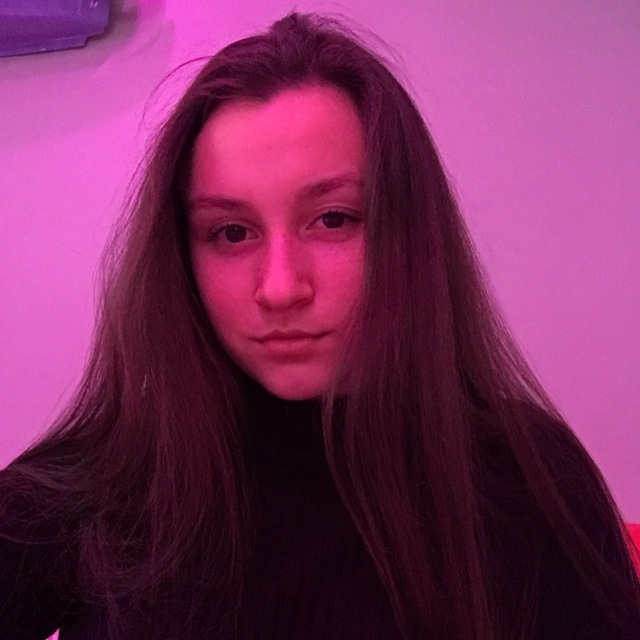
I saw explosions, open flames, a smoking airport. I remember how they tried to reassure us online that these were only provocations, they said that no one was bombing residential areas. As it turned out later, it was a blatant lie. And I was furious at how brazenly, unprecedentedly and absolutely groundlessly they opened fire on the civilian population – on the citizens of my country. I love Ukraine very much, I love people, and I was just bitter and hurt by what I saw. It made its way to trembling, and after this there was no longer any place for fear.
We went on the defensive with full confidence – there was not the slightest hesitation. I knew for sure that people who know the physiology and anatomy of a person are clearly needed in a war. We have a military medic in our company, another one has recently joined – all volunteers who are not indifferent to their country. We are definitely not superfluous people, because we conduct master classes on providing the first “pre-medical help” – we tell what people will have to do before the arrival of doctors, and explain how to provide emergency assistance.
People who know human physiology and anatomy are clearly needed in war
How to handle weapons, they explained to us right away, but when more time appeared, we began to study this issue in more detail: how to disassemble it, what stance to take. There are a lot of those who have never held a machine gun in their hands – most of the battalion consists of volunteers. These are the guys who simply could not stand aside when they heard about the martial law in our country. They were given a weapon, a permit for it and had a preliminary briefing. And already here they began to regularly carry to the conditional "shooting range". This is a place where we shoot at targets from different positions, so everyone who is here has already shot repeatedly.
The soldiers in the company are very friendly to us and help in everything. We are only six girls in the battalion. Recently, the guys imitated recoil – they taught us how to properly hold a weapon in any position: in a squat, standing, lying down. Then they showed how to throw Molotov cocktails.
We are medical shooters. If there is open fire, then we are not allowed on the battlefield, because a dead medic is worse than a living one. If there is a wounded fighter, then stronger guys should drag him to a safe place, and we are already there providing first aid.
If there is open fire, then we are not allowed on the battlefield, because a dead medic is worse than a living one
In my experience, there was such a case: at night, after curfew, a man with a “Z” symbol on the hood, without stopping after numerous warnings, knocked down our checkpoint and threw a grenade. Fire was opened on him, he was wounded. When the shooting ended, we went out and gave him first aid, although he was not our fighter, but a marauder.
Is it hard to be a girl in a war? Frankly, not as much as one might imagine. The soldiers in the battalion are trying to protect us, they often say: “Girls, do not poke your head under the bullets. If anything happens, you must stay at the base. You are the most important thing for us." This is both touching and frustrating at the same time, because we went with the expectation that we would not be petted and cherished here. We expected to be full-fledged fighters without any special treatment, but in reality it turns out differently.
But a girl should remain a girl even in war, so at first we tried as much as possible to ennoble the area in which we were placed, we tried to ensure that the boys had hot drinks and food. We tried to cheer them up with conversations, because we understood that they were left without relatives and friends, and now they are especially hard and lonely. The main thing for us was to show that we are all one, so that no one in the company feels like a stranger.
I can safely say that psychological support is no less important than physical, many people want to talk or just listen, forget for a while that there is a war in the country, cities are collapsing and people are dying. Even those who have rich military experience speak of this. If everyone walks around sad, dull and gloomy, then we will not win the war. Only a good, healthy spirit, a healthy psyche and strong thoughts, as well as the confidence that we will overcome all this, contribute to the speedy victory and overcoming of the enemy.
At first, the shots were very shocking. We constantly thought whether it was an arrival or an exit, then it became easier. It was, of course, very scary for the first time to hear the sounds of a real firefight and look at it literally from a distance of five meters, but now there is no fear anymore, there is no time to be afraid – you need to defend your country.
Yarina Arieva, deputy, territorial defense: “This is my land, and I will kill for it”
Before the war, I was a member of the Kyiv City Council, received citizens, prepared for a wedding, and made repairs. It was calm and good, but then everything collapsed literally in one second. At first, what was happening was like a nightmare: I woke up at 6 in the morning from a call from my boyfriend, who said that the war had begun. Oddly enough, the shock passed very quickly – I had long felt that this could happen one day. Many of my ancestors suffered greatly from the Russian authorities, and I expected the same fate.
Then, first of all, I thought about people, there was a desire to fight and become part of something bigger – to join. I am sure that almost every Ukrainian experienced this feeling at the beginning of the war. At some point, a feeling of unity appeared in the very air – very similar to what was embracing on the Maidan. It was it that became for me the driving force that prompted me to join the territorial defense the day after the start of the war.
The work tasks immediately changed – now most of the time I try to help people who have problems with buying food and medicine, I try to support the defense of the city – all the activities of the local Rada are now directed to this.
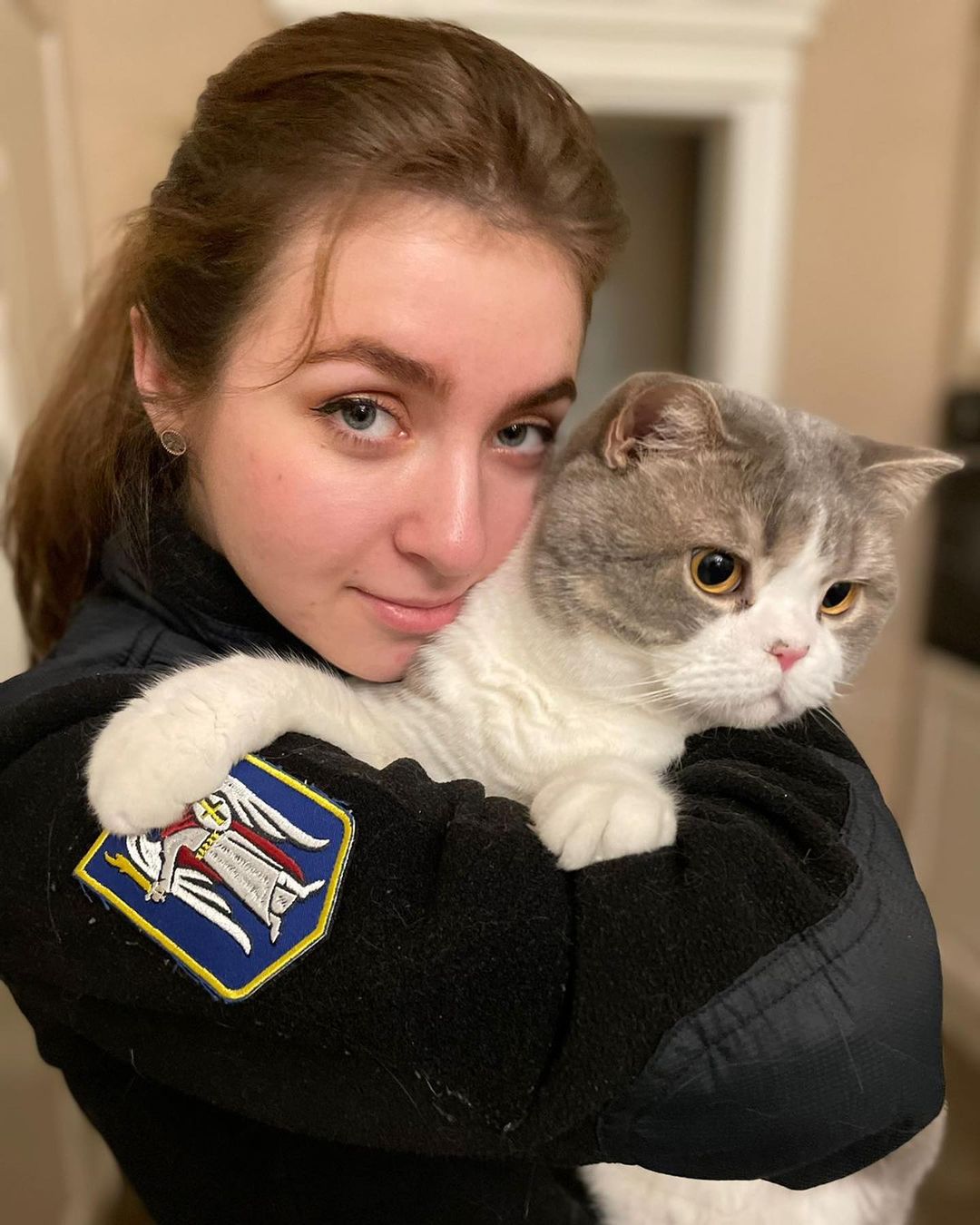
If I have to go into battle and fight in the crossfire, I will go without hesitation. This is my land, and I will kill for it if necessary. Those who come to us are doing terrible things: raping women, killing children, wiping entire neighborhoods from the face of the earth, destroying everything they can. They don't deserve the right to live, and I don't deserve the right to fear.
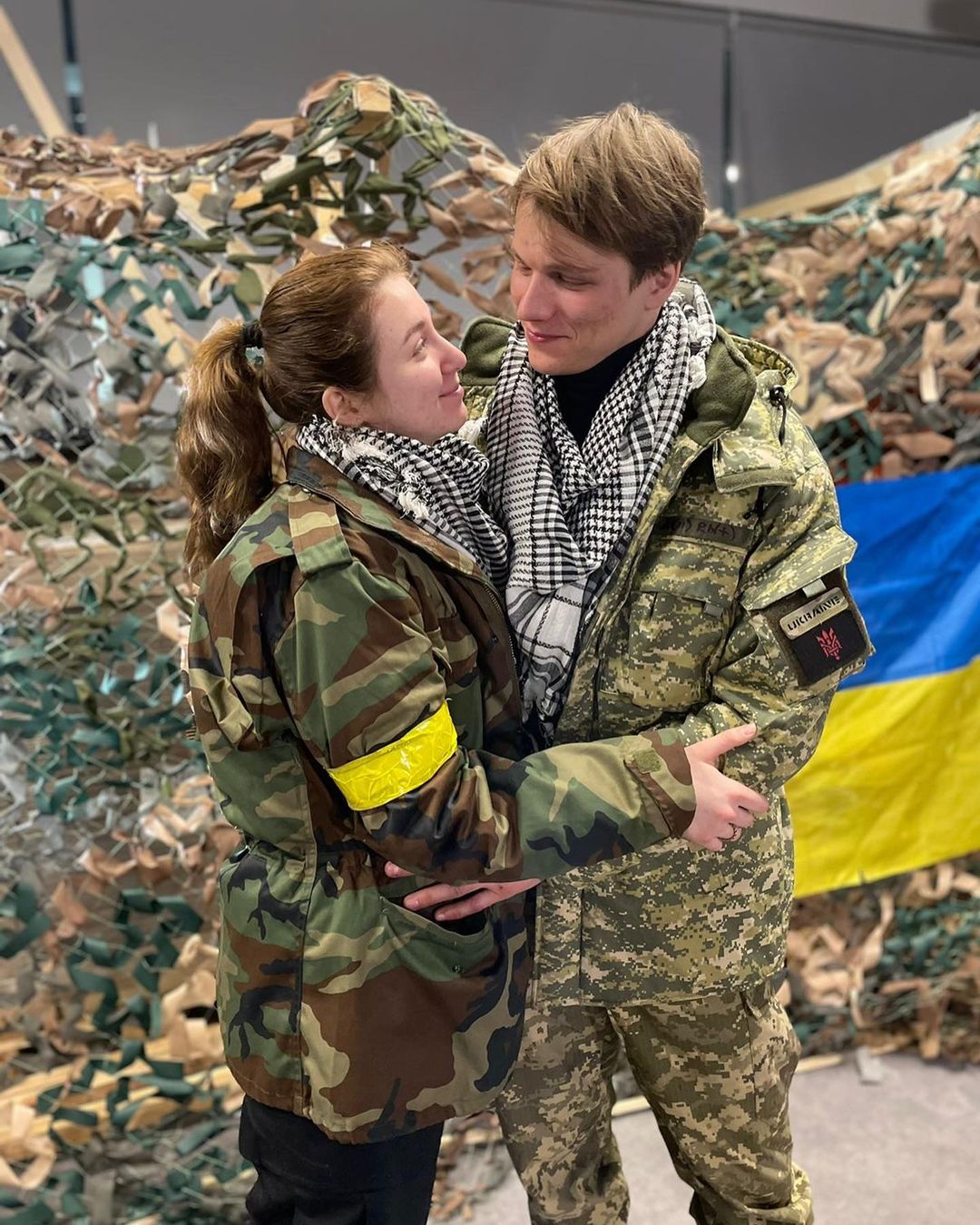
I was scared only once: when my husband was in positions, and I was waiting for his return, not knowing what was happening to him. This was probably the most frightening thing for me – my own life does not cause me anxiety. I stopped being afraid for myself even in the first days of the war – I suddenly realized that there is nothing worse than the loss of a loved one.
If it is necessary to go into battle, I will go without hesitation.
The sounds of firefights and explosions have become a regular picture of life, to which we are gradually starting to get used to. I remember how, after one of these raids, I ended up at the site of the explosion, or rather, on that piece of land where something else was left. A completely scorched house, broken windows and the people who recently lived in it are wounded, frightened, many without the opportunity to leave. After the explosion, they moved to neighboring shelters, some of them constantly came to the house and sat on benches. This house is still standing, but it seems to be gone.
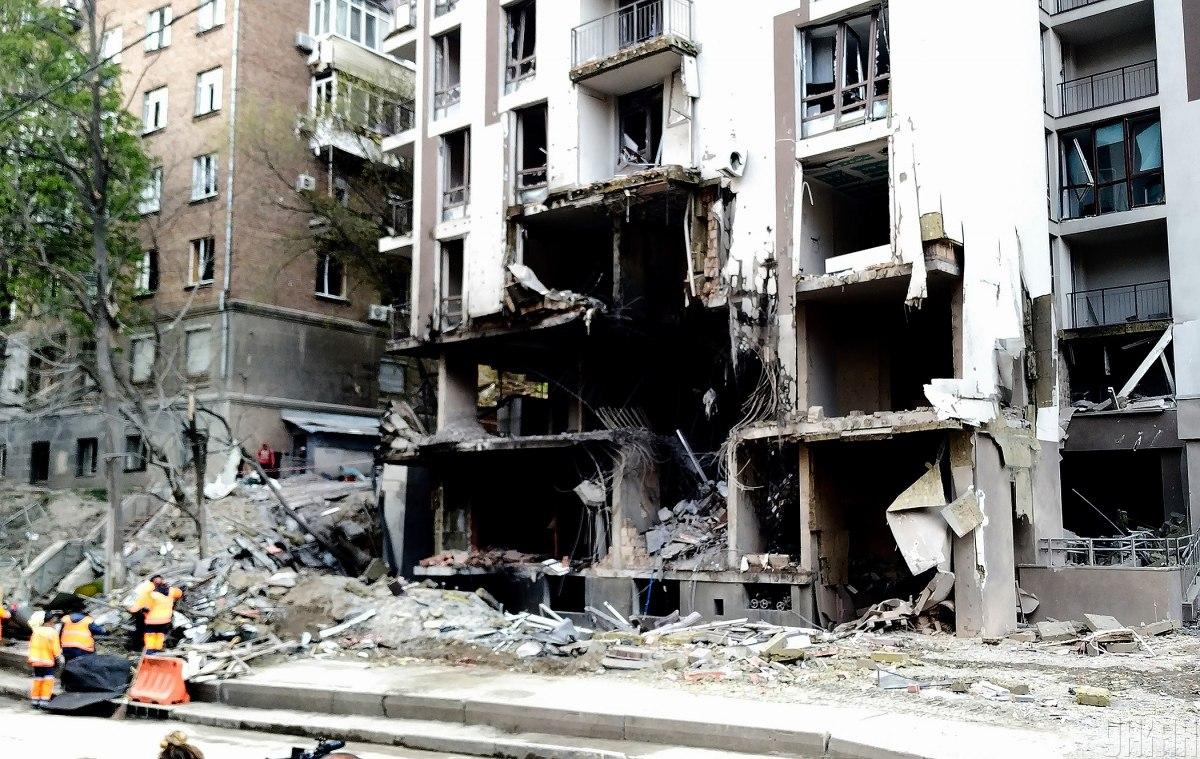
In our battalion, the duties of men and women differ significantly: we work in a warehouse, in a kitchen, at headquarters. Those of us who are more experienced are on more combat missions, standing in checkpoints or on duty and always ready to go into open battle.
Those who serve with us were deputies, singers, artists before the war, and now they are fighting for their freedom on a par with professional military men, like real soldiers. In the evening, when there is time, they tell stories from their lives, share their experiences – in a war it seems so strange and awkward. I like that this horror was able to unite all of us: all types of people of different views and professions suddenly rose overnight and went to defend their country, which was attacked unscrupulously and ruthlessly.


